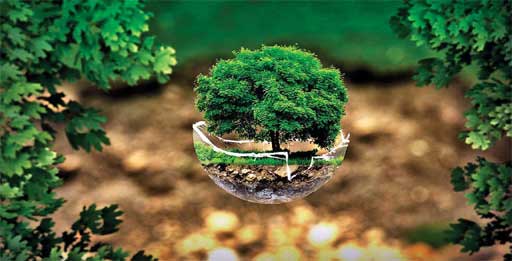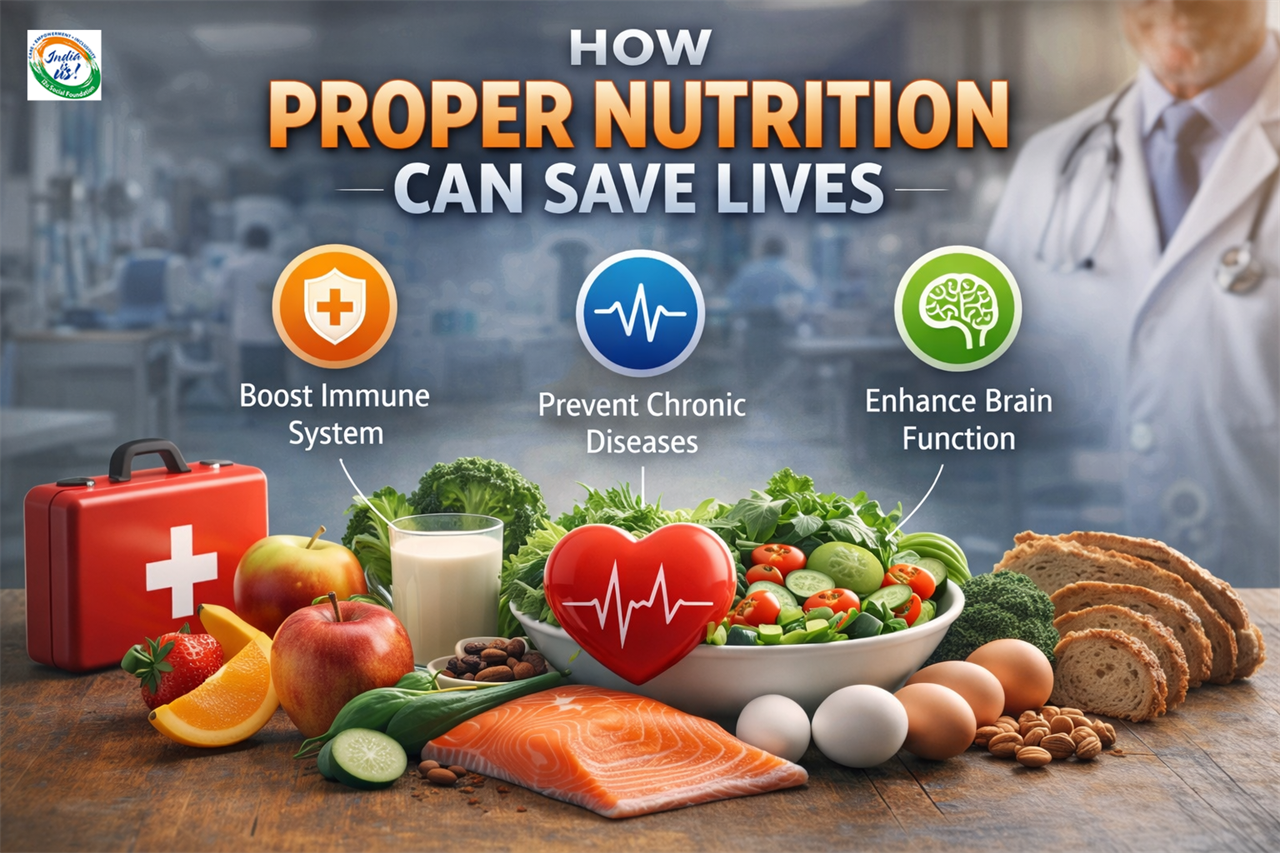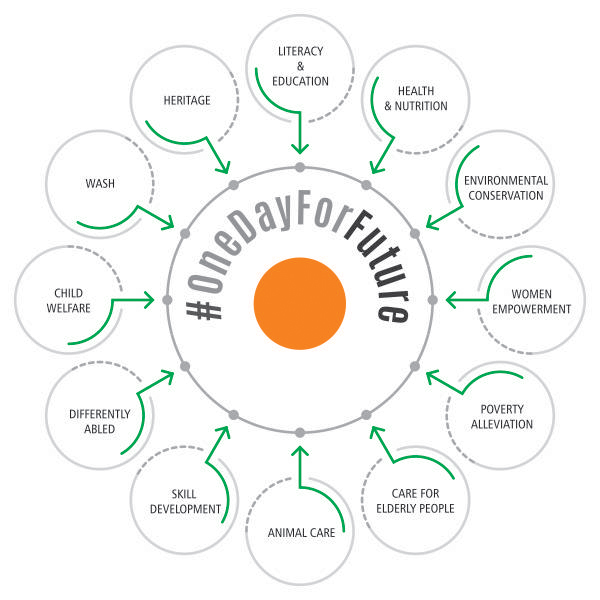Use your power to make a difference by joining our Let's Do Good initiative.
Save Environment to Save the Planet
Saturday , 01 January 2022- 5 min. read
In our rapidly evolving world, environmental concerns have become increasingly important. Recognizing the significance of preserving our environment is essential for the well-being and continued existence of future generations. By embracing sustainable practices and making mindful decisions, we can all play a part in protecting our planet.
The Environmental Protection Act of 1986 has defined the term ‘environment’ as including water, air, and land and the inter-relationship that exists among and between water, air, and land, and human beings, other living creatures, plants, micro-organisms, and property. Saving the environment requires us to dedicatedly pay attention to the needs of all these components of the environment. It is the interaction between these constituents that enables a functional ecosystem that sustains life on Earth. In recent decades, increased human activity and the accompanying unsustainable consumption of natural resources have caused a significant imbalance in the planet’s existing ecosystem and caused severe degradation of resources.
The Importance of Saving the Environment
The environment is fundamental to sustaining life on Earth, providing us with the air we breathe, the water we drink, and the resources necessary for survival. By preserving the environment, we maintain the delicate balance of ecosystems and protect the rich diversity of life. Furthermore, a healthy environment contributes to the overall well-being of humanity and helps alleviate the impacts of climate change.
The growing human population on Earth has resulted in an increased demand for resources such as food, water, electricity, shelter, and commodities such as automobiles and electronic gadgets. In order to meet these demands, tremendous pressure is exerted on the planet’s natural resources, leading to the depletion and degradation of resources, as well as the pollution of air, water, and soil. Human activities that facilitate these demands have contributed to the warming of the planet. The average temperature in many regions is increasing across Earth, and countries lying at mid to high latitudes are also experiencing increased rainfall. The world is witnessing frequent extreme weather events and natural disasters. Human activities are causing the Earth to continuously lose its ability to balance itself. Carbon dioxide, a major air pollutant, has increased by 31% in the atmosphere since pre-industrial times and has resulted in more heat being trapped in the lower levels of the atmosphere. Studies show that carbon dioxide levels continue to rise each year. Many treaties have been signed at national and international levels to reduce the production of greenhouse gases that directly contribute to global warming and ozone layer depletion. Though positive changes have been seen, these measures have not been effective enough to prevent significant changes in the climate or the rise in sea levels.
Climate change will have serious, perhaps irreversible, effects on human society. There will be an increase in the frequency of droughts and floods, posing a great threat to human life and physical assets such as buildings and vehicles. Health is also a major concern. Public health relies on the quality of water, food, and physical surroundings. With climate change, the supply of fresh water and the process of food production will be seriously affected. This could lead to innumerable diseases or starvation, even regional conflicts. Climate change will also lead to displacement of many societies, and create environmental refugees. In this light, it is extremely important for us to take measures to save the environment. Saving the environment means prolonging the lifespan of humankind on the planet, along with the lifespan of other living species.
Biodiversity Preservation
Biodiversity preservation is a crucial aspect of environmental conservation. Biodiversity encompasses the vast array of plant and animal species inhabiting our planet. It is vital for upholding the equilibrium of ecosystems and ensuring the survival of countless organisms. Preserving biodiversity is essential, as it bolsters ecological stability, enhances the resilience of ecosystems, and delivers numerous ecosystem services. These services range from pollination and nutrient cycling to climate regulation. By safeguarding the environment, we protect biodiversity and maintain the intricate web of life on Earth.
The value of biodiversity is enormous. It plays an essential part in the global food supply as the main sources of human food constitute plants and animals. Biodiversity also has productive value, as animals as well as plants are used for commercial purposes, and social value as many species are associated with religion, spirituality, and social life. The most significant value, efficient in appealing to the conscience of common people, is that of aesthetics. Most people enjoy visiting areas where nature has been preserved in its original state and interacting with the diverse flora and fauna found there. This encourages them to invest time and energy to preserve biodiversity for its aesthetic value and indulge in eco-tourism. Biodiversity holds manifold value for humans and, therefore, must be preserved.
Understanding the threats to biodiversity plays a key role in working for its preservation. At present, the greatest threat to biodiversity is habitat loss. Habitat loss is driven by factors such as human population growth, industrialisation, changes in land use patterns, poaching of wildlife, and man-wildlife conflicts. Forests and grasslands are being used for agricultural purposes and wetlands are being drained. Excessive deforestation is being carried out to clear land for urbanisation and other commercial ventures. Species with economic benefits face the threat of extinction due to mindless poaching. Conflicts with wildlife are rising due to humans encroaching into their habitat. Such encroachment deprives them of shelter, food, and other resources needed to survive. It has been estimated that human activities will eliminate almost 25% or 10 million known species by the year 2050. In this light, it is crucial for us to do our part in preserving biodiversity.
Humankind needs biodiversity to maintain the ecological balance on Earth, the support system for the planet to support life. We have no way of predicting which components of biodiversity will be useful in the future. As such, there needs to be a holistic approach to its conservation. Biodiversity conservation is an essential part of fighting climate change and includes protecting at least 50% of Earth’s land and sea regions. Some major ways to ensure the preservation of biodiversity are embracing environment friendly measures in legislation, preserving unique ecosystems, and restoring ecosystems that have been tampered with by human activities. At the individual level, you can participate in environment drives, and encourage the people in your surroundings to educate themselves and others on matters related to the environment.
Simple Actions to Protect the Environment
Most people reason that they aren’t powerful or impactful enough to save environment. While large-scale actions are appreciated, we can all contribute towards saving the environment through small, daily actions. Every choice we make regarding our lifestyle, our purchasing practices, and our management of personal waste impacts the environment. Here are some simple steps you can take to contribute to a healthier planet:
1. Embrace the Three Rs: Reduce, Reuse, and Recycle
- Adopting the three Rs—Reduce, Reuse, and Recycle—is a highly effective way to protect the environment. By consuming less, repurposing items, and recycling waste materials, we can reduce our environmental impact. This approach helps preserve resources, decrease landfill waste, and curb pollution.
- Reducing means consuming fewer resources and, therefore, decreasing our carbon footprint. It also includes being mindful of our energy consumption practices.
- Reusing means giving items a second life. It not just finds an alternate use for items, but maximizes their lifespan. Reusing appeals to our creativity for finding new purposes for items, and leads to a reduction in demand for new resources.
- Recycling is the process of transforming waste into valuable resources. By recycling, we can contribute to a cycle that saves our planet from the harmful effects of irresponsible waste disposal. It significantly reduces the greenhouse gas emission that takes place when things are manufactured from scratch, and also helps protect wildlife as improper waste disposal disrupts ecological balance.
2. Save Energy at Home
Conventional energy production leaves a large carbon footprint on the planet. Conserving energy is crucial for lowering greenhouse gas emissions and fighting climate change. It allows us to sustain our existing resources and improves our general well-being. There are a lot of ways with which we can make our homes energy efficient, and also reduce our electricity bills. You may use the following energy-saving tips for your household:
- Choose energy efficient appliances and light bulbs.
- Turn off lights and electronics when not in use.
- Utilize natural lighting whenever possible.
- Insulate your home to decrease heating and cooling demands.
- Cut down on air-conditioning.
- Use power-strips to unplug electronics that use phantom power when switched off.
- Replace old appliances with energy-efficient ones.
- Switch to compact fluorescent light (CFL) bulbs.
3. Conserve Water
Water is a valuable resource and a basic necessity for every living being. With each passing year, freshwater is becoming more and more scarce. Growth in population has caused an unsustainable increase in the water demand. Wastewater from domestic household practices, joined with wastewater from agricultural and industrial activities leads to water pollution. This may lead to an increase in the temperature of water bodies, cause a disbalance in aquatic life, and cause diseases to wildlife as well as humans. Conserving water will allow us to have a larger amount of freshwater for future use, and ensures easy access to water by areas with little water access. Consider incorporating these water-saving habits into your daily routine:
- Repair leaky faucets and pipes quickly.
- Take shorter showers and use water-saving showerheads.
- Collect rainwater for gardening purposes.
- Water plants during cooler times of the day to reduce evaporation.
4. Choose Sustainable Transportation:
Transportation significantly contributes to carbon emissions. Vehicular emission is the most famous cause of pollution, especially in metropolitan cities. It accounts for about 25% of the world's carbon dioxide emissions. Sustainable transportation reduces humanity’s negative impact on the planet as it is energy-efficient, affordable, and has low or zero emissions. By choosing a sustainable mode of transport, we can decrease our carbon footprint and contribute to the betterment of the environment. These options may be put to use:
- Use public transport or carpool when possible.
- Walk or bike for shorter distances.
- Opt for fuel-efficient vehicles or consider electric cars.
5. Support Local and Sustainable Food
The food industry greatly impacts the environment. Sustainable food choices positively impact the environment by holding food supply corporations responsible for their social and environmental impacts. It also ensures a mutually respectful relationship between producers and consumers. By supporting local and sustainable food practices, we can foster a healthier and more eco-friendly food system. Consider the following practises:
- Purchase locally sourced and organic produce.
- Substitute prepackaged convenience food with fresh, locally sourced food.
- Minimize food waste by planning meals and composting leftovers.
- Select sustainably harvested seafood.
- Cultivate your own fruits, vegetables, or herbs.
6. Some Additional Tips
- Take the stairs instead of the elevator.
- Avoid single use plastics.
- Wear clothes made of certified organic fabrics.
- Buy food in reusable containers.
- Recycle materials such as glass, plastic, paper, aluminum, steel, etc.
- Reduce unnecessary creation of waste.
- Substitute new pieces of furniture with second-hand items.
These are seemingly small actions, but when practised by households across cities and nations, they have the capability to make significant and positive contributions to the environment.
Sustainable Development
Sustainable development is a very popular term in discussions on the environment. Sustainable development is the development that meets the needs of the present generations without compromising the ability of future generations to meet their needs. It is concerned with equity between countries and continents, races and classes, genders and ages. It takes the requirements of the environment into account while also promoting social and economic development. In simple words, sustainable development is concerned with improving the quality of life for all, including the planet itself.
Developmental projects such as mining, construction of dams and roads, and industrial and tourism development have severe environmental consequences. Often these projects are undertaken without conducting proper studies of their environmental impact. Such projects lead to damaging of essential ecosystems such as forests. Forests play an important role in maintaining air quality by absorbing carbon dioxide and increasing oxygen levels. Their loss leads to biodiversity depletion. Major heavy industries, if established without due regard given to environmental factors, cause severe degradation of air, water, and land resources and cause long-term health hazards to the inhabitants of the area. The economic benefits of a project must not outweigh the environmental impact. To ensure sustainable development, such projects should be approved only after conducting scientific and honest environmental studies so that the economic growth brought about by them is balanced with their environmental impact and is consistent with long term growth and development.
All of us contribute to the degradation of the environment, directly or indirectly. It is our responsibility to make environment conscious choices wherever possible and to inspire similar behaviour in those around us. It is imperative for us to educate ourselves and others about the needs of the environment, the immediate and long-term threats it faces, and the measures that can be taken to alleviate these threats. Creating environmental awareness will lead to environmental conservation, and will save the planet.
As members of humankind, it is our duty to ensure development projects in and around the areas we live in are carried out in accordance with the requirements of the environment. We need to take whatever steps necessary, at personal as well as social levels, to ensure the protection of the environment. Taking such initiatives is the only solution to the ever-increasing problems of the environment. This requires creative, technological, and financial resources from the entire human society. Such concerted efforts will save environment, and make Earth a better place to live.





.jpeg)












